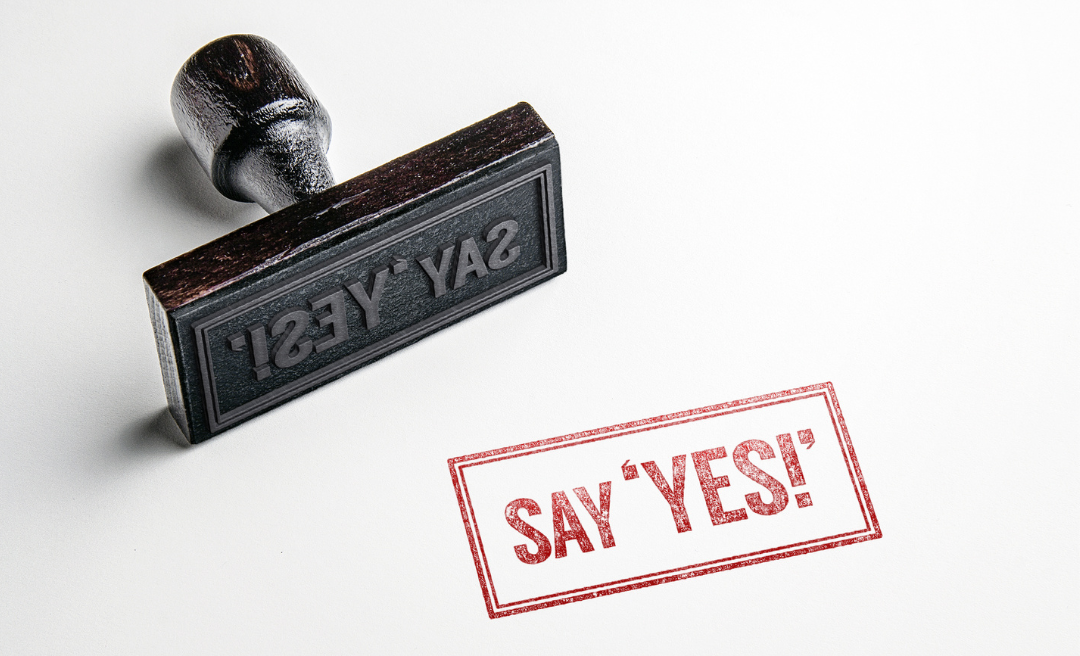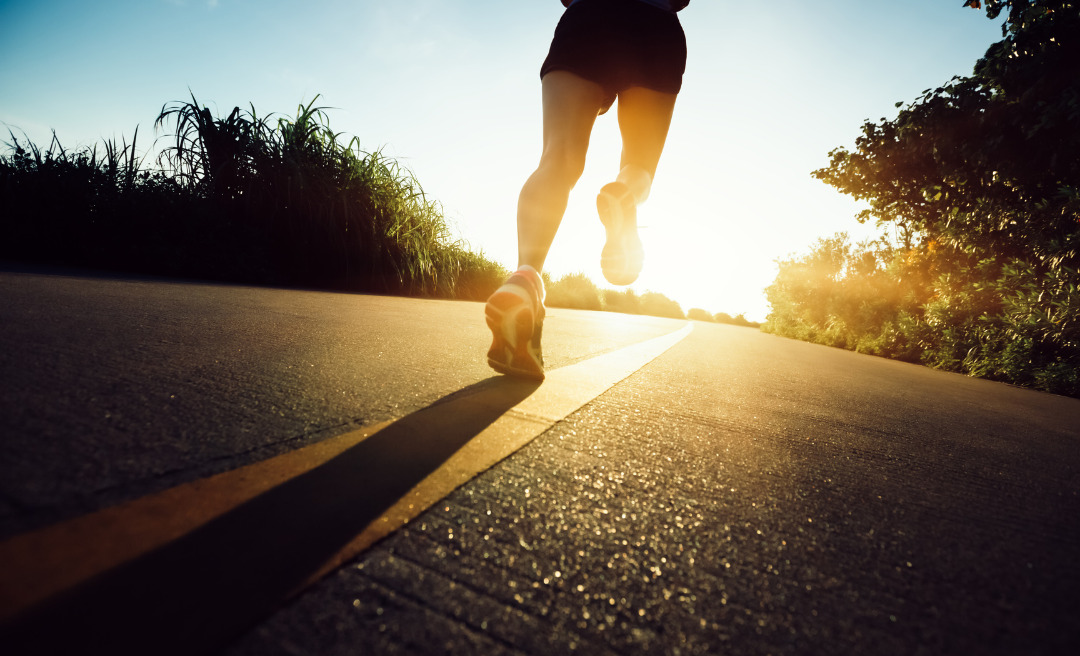
Whether you’re saying yes to karaoke or something else, trying something new has its benefits.
There I was, staring at the huge catalog of song titles, debating whether or not I should add my name to the queue of singers. I had never done karaoke, but always wanted to try. But now, at a British-style pub surrounded by people I didn’t know well? Nuh-uh. I shook my head and repeated the two-letter word several times to the woman at my table who was nudging me to sign up. No way in hell was I doing this. No, no, no.
Then I remembered something I had read years ago in Shonda Rhimes’ book, A Year of Yes: How to Dance It Out, Stand in the Sun and Be Your Own Person. The producer/creator, a self-described introvert, wrote about how she spent one year saying yes to all the things that scared her. She even did a TED talk on the topic. “Anything that made me nervous, took me out of my comfort zone, I forced myself to say yes to. And a crazy thing happened: the very act of doing the thing that scared me undid the fear, made it not scary. My fear of public speaking, my social anxiety, poof, gone. It’s amazing, the power of one word.”
As I pondered what song I would sing—if I could muster the courage—I also thought about the fact that lately, I’d been talking and writing so much about the beauty of saying no during midlife. Apparently with age comes the realization that we no longer need to do all the things, all the time, for everyone. That we are allowed to pick and choose how we use our time and energy. That it’s OK to turn down an offer.
But in the process of giving ourselves permission to say no, did we forget how powerful it can be to say yes?
In the process of giving ourselves permission to say no, did we forget how powerful it can be to say yes?
For the record, I’m not talking about saying yes when you really should (or desperately want to) say no. Like when you’re exhausted and coming down with a cold, but feel bad not making it to a friend’s event. Or when that toxic person wants to meet up for coffee. Or when you know that job is a terrible fit, but you’re afraid to pass it up. There’s something to be said for listening to that little voice—along with that pit in your stomach—that’s trying to warn you about something. In these instances, saying no is the sane thing to do, and at this stage of life you’re entitled to a little sanity.
But instinct works both ways. The next time you find yourself shaking your head and saying no, take a minute to feel what your body and soul are telling you. That voice may actually be more open than you originally thought: “No, I couldn’t…Well, wait, it would be kinda nice…Could I?” And that rumbling in your tummy may be excitement rather than (or in addition to) fear. If you pay close attention, you may discover that some part of yourself wants to say yes after all.
The truth is, often we really aren’t paying attention. By the time we get to midlife, we’ve been there, done that. We’ve experienced our share of disappointment and embarrassment, and now we just want to feel in control and competent. So we’ve settled into our little bubbles with their self-defined boundaries and limitations. As a result, we take fewer risks. Some of us are even on Autopilot.
But is this where we want to be?
“There’s a natural tendency for people to be hesitant when asked to do something outside of their comfort zones,” Bernardo Carducci, professor of psychology and director of the Shyness Research Institute at Indiana University Southeast, told Fast Company. “The problem is when you do this too often. If your primary response becomes no, you will never discover and test your true limits.” In other words, if you stay on Autopilot, you’ll never know how high you can soar.
Let’s Make Lots of Mistakes
When my kids were in elementary school, a huge sign in the kindergarten classroom announced, “Let’s make lots of mistakes this year!” Unlike our generation, these children were taught from a young age that failing is a great way to learn, grow and build resilience. Unfortunately, some of us have never gotten that memo. But it’s not too late.
When I was younger, I would hesitate to try something new, especially in front of others, unless I thought I’d be good at it. This perfectionistic attitude held me back from experiencing all life had to offer. I wasted so much time worrying about making a fool of myself, that I missed out on a whole lot of fun and personal growth.
Now that I’m older, I don’t want to squander the precious years I have left—especially the time that my body is still healthy, energetic and lithe. If I don’t dive into my bucket list now, then when? If it turns out I’m not good at singing, or salsa dancing, or writing a play, who really cares, as long as I had a blast trying. And my foibles can always be another story to tell in my old age.
If you’re still not sure you’re ready to venture out of your comfort zone and open yourself up to new challenges and experiences, here are some other reasons why saying yes more often is good for you.
Saying yes boosts your confidence.
The adrenaline rush and sense of accomplishment that come with trying that new sport, giving that toast or taking that meeting can do wonders for your self-esteem and mojo. Putting yourself out there is a reminder that you’re alive and in the game. If the outcome isn’t stellar, that’s OK too, because you failed and lived to tell the tale—which only proves just how badass you are. Taking risks is essential to becoming an interesting, courageous person who embraces life. You know you want that to be you.
Saying yes opens you up to new opportunities.
If you hadn’t said yes to that meeting, maybe you never would have landed that great gig. If you hadn’t said yes to brunch with your friend and her co-worker, the latter wouldn’t have become one of your BFFs. If you hadn’t gone to the party that night, you might not have met your significant other. Enough said. (And sure, we could go down the list of times saying yes didn’t pan out, but what’s important are the ones that did.)
Saying yes invites collaboration.
Another lesson I learned from my kids’ school is the power of saying yes during a conversation—especially when opinions differ. In middle school, the children were challenged to replace the word “but” with “and” during interactions, in order to gain common ground before dissenting. When you say yes to someone, it shows you are paying attention; it also signals trust. When my husband, who’s a cyclist, asked me to go on a bike ride (and I really wanted to say no, because I prefer to run), I said, “Yes, let’s do that…and then maybe next week you can come with me on a run?” Even though I was slow at climbing those hills and my butt hurt afterward, I enjoyed the ride and sharing the afternoon with my husband.
Saying yes is good for your brain.
According to Keith Rollag, author of What to Do When You’re New: How to Be Comfortable, Confident and Successful in New Situations, research suggests that as we enter middle age, our lives tend to become more routine and we unconsciously become less willing to seek change. As we use less of our brains, those unused neurons stop generating new synapses and have fewer connections with other neurons, making our brains age more quickly. However, says Rollag, neuroscientists have found that “putting yourself in new, challenging, interesting situations [that] force you to think and act in different ways” can encourage neuron and synapse growth. “The implication is that if we can change what we experience, we can change our brain, and all the things that our brain facilitates, including intelligence, personality, habits, and attitudes.”
Saying yes may help you live longer.
As Carol S. Dweck wrote about in her groundbreaking book, having a growth mindset is crucial to longevity. She argued that each of us can decide to have a fixed mindset or a growth mindset. The former is marked by a rigid set of beliefs about yourself and the world that limits the possibility of growth and change; people with this outlook tend to give up easily, dismiss feedback and avoid challenges. A growth mindset is the opposite; it seeks out challenges, learns from experiences and criticism, and is persistent and optimistic. Aside from helping you maintain your brain plasticity and cognitive health, a growth mindset encourages a robust lifestyle that’s purposeful and meaningful to you. And studies indicate that people who adopt this way of thinking tend to enjoy their retirement and have longer life spans.
Saying yes can make you feel more alive.
Like falling in love, saying yes to new experiences can turn your world Technicolor. When we try something new, our brains release large amounts of dopamine, a neurochemical that helps neurons create the aforementioned new synapses. “Long ago, this sudden release often kept us alive, putting us in rapid learning mode to deal with emerging threats like predators,” Rollag writes. “These days new situations are rarely fatal, but the dopamine release still helps us to be focused, alert and primed to learn new things.” Dopamine also boosts our feelings of happiness. “We’ve all experienced the thrill of something new, and that excitement that comes from new accomplishments. That’s dopamine at work. Scientists who study happiness have found that one of the best ways to bring more happiness into our lives is by meeting new people and trying new things.”
In case you’re still dubious that saying yes is crucial to feeling alive, I’ll leave you with the immortal words of James Joyce’s character Molly Bloom, whose closing soliloquy in Ulysses was an ode to yes. The three-letter word is sprinkled with abandon throughout the monologue, and clearly Joyce decided that encumbering it with punctuation would have been a crime:
“…And Gibraltar as a girl where I was a Flower of the mountain yes when I put the rose in my hair like the Andalusian girls used or shall I wear a red yes and how he kissed me under the Moorish wall and I thought well as well him as another and then I asked him with my eyes to ask again yes and then he asked me would I yes to say yes my mountain flower and first I put my arms around him yes and drew him down to me so he could feel my breasts all perfume yes and his heart was going like mad and yes I said yes I will Yes.”
Joyce noted in a 1921 letter that to him, the word yes meant “acquiescence, self-abandon, relaxation, the end of all resistance.” I’d like to update that with the less subversive adjectives “empowering, intentional, confident, courageous and yes, sexy.” And if you want to see Joyce’s words in action, watch the late, great actress Sally Kellerman interpret them in her role as a college professor in the 1986 film Back to School.
Clearly this is a word that can elicit some interesting outcomes.
So I found out that night at the bar, when I finally listened to my inner voice that was telling me that yes I wanted to sing karaoke, and yes I really wanted to have some fun and yes I would probably make a fool of myself but yes I would do it anyway. The result? By the end of the four-minute song, my blood was pumping and my heart was racing and I had a huge grin on my face. Sure, I’d been off-key at times and forgot some of the lyrics. But the experience reminded me how comfortable I am on stage, that taking risks is vital to my creativity, and that it’s always a good time to laugh at myself.
Best of all? I can now scratch one more item off my bucket list.




